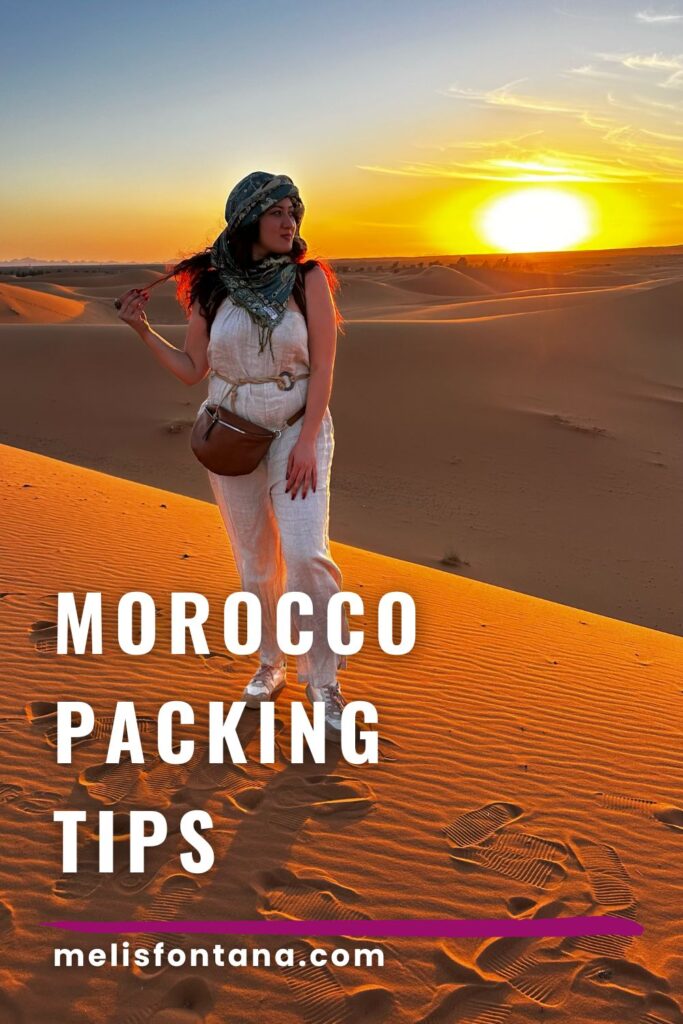
Hello everyone! While I have started to organise Morocco tours, I have turned some information into a blog post as a guide. In this article, we will be talking about what to wear when going to Morocco, what to put in the suitcase for Morocco holiday, how women should dress in Morocco, how men should dress in Morocco.
Morocco is a unique destination in every sense of the word. A country of cosmopolitan and historic cities, rugged mountainous valleys, endless deserts and stunning coastlines stretching from the Atlantic Ocean to the Mediterranean Sea.
The official state religion of Morocco is Islam and 93% of the population is considered to be religious. The majority are Sunni Muslims. This means that most women cover their shoulders, knees and usually their hair, and some women even wear a burqa when going out.
For this reason, as a woman travelling in Morocco, it will make you feel better if you cover your shoulders and knees. When visiting a religious building, we will cover our heads, so it is useful to have a scarf with you (the only mosque you can visit in Morocco is the Hassan II Mosque in Casablanca).
Considering all these factors, it can be difficult to determine what to wear and what to take with you in Morocco.
That’s why I have prepared a packing list for Morocco that goes beyond what you should take with you for a typical trip abroad.
Let’s get started!
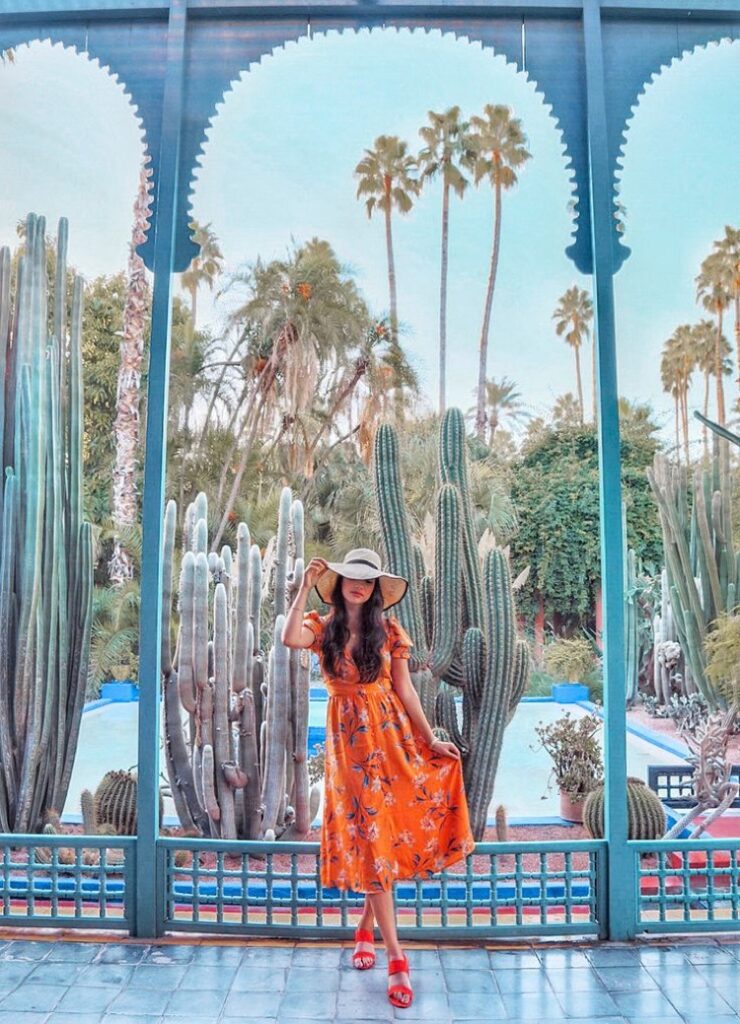
What should you take with you to Morocco?
When visiting Morocco, in addition to cultural requirements, it is important to think about the clothes that will protect you against changing weather conditions. No matter what season you are in, you should take warm clothes with you and be prepared for all weather conditions.
You can sweat from the heat in the souks of Marrakech and get cold at night in the Atlas Mountains and the Sahara Desert. You may have heard of desert cold, at night the temperature can drop to 0 degrees Celsius!
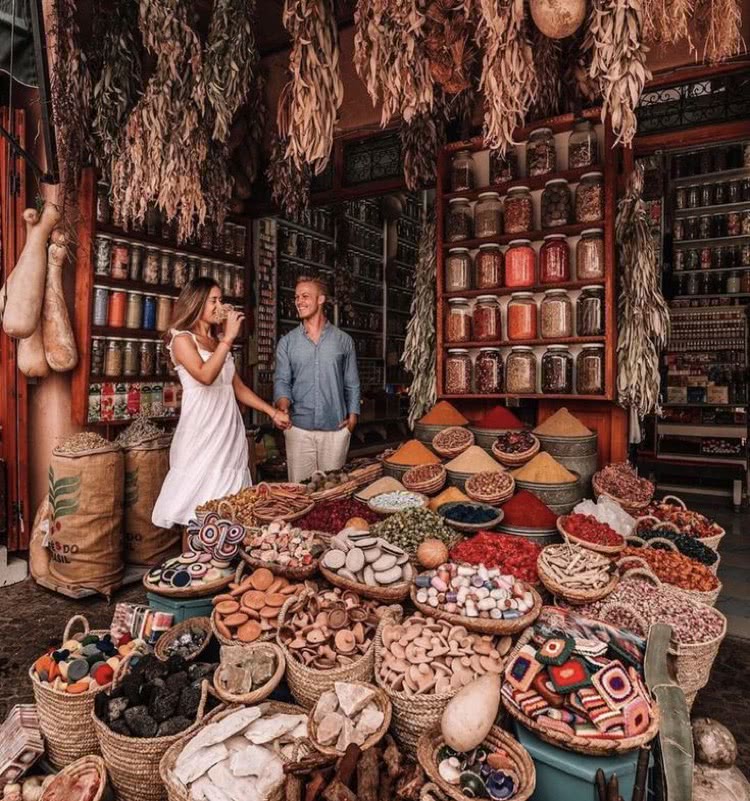
How should women dress in Morocco?
Compared to most Muslim countries, female tourists in Morocco are generally more relaxed in terms of clothing.
While the main tourist areas are generally accepting of foreigners’ style of dress, some rural areas you visit may be a little prejudiced against open dress. There is therefore a dress code that tourists should consider.
When deciding what to wear as a woman in Morocco, it is important that you favour a little conservatism. You don’t have to worry about covering your hair, but you should pay attention to the following recommendations.
- Try to cover your shoulders, knees, chest and belly as much as possible. In touristy places like Marrakech or in the desert it will not be a problem, but in small villages you may need to cover yourself with a shawl if you are dressed too revealing.
- Make your clothes loose and draped. Avoid tight tops and trousers. This is also important if you are travelling as a single woman. No need to worry when travelling in a group.
- Avoid deep cleavage, short shorts and skirts. Unfortunately, men in Morocco may perceive this as an invitation. Again, if you are travelling alone, I recommend you to pay attention to this.
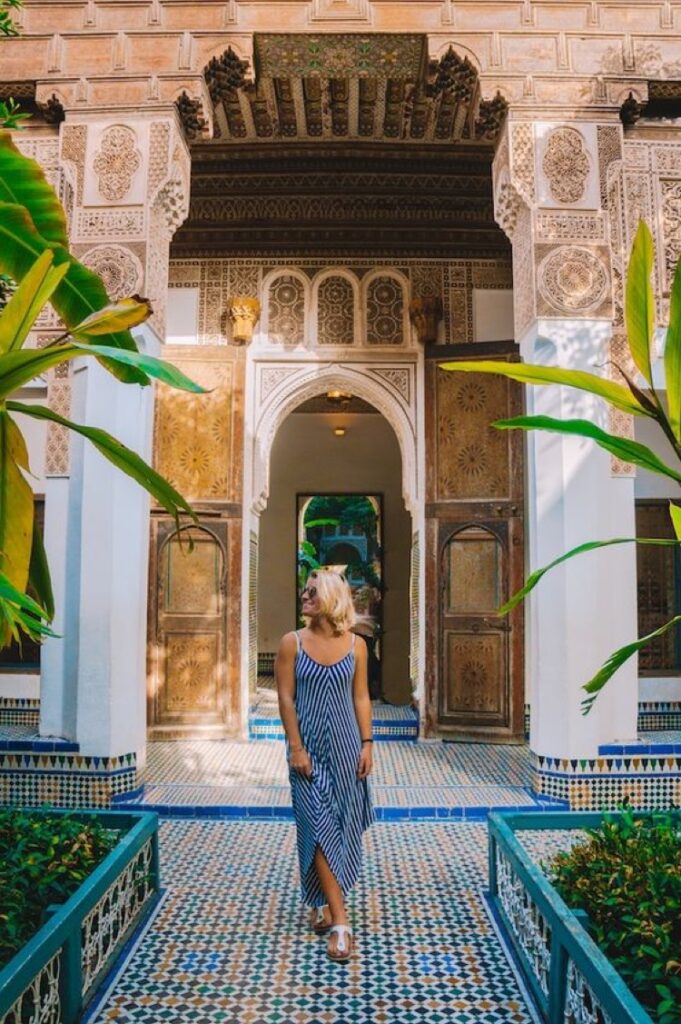
However, you can dress much more freely when travelling with your boyfriend or in a group. I can say that these suggestions are more for women travelling solo.
By the way, if you are thinking of buying jewellery in Morocco, be careful not to put too much jewellery from home in your suitcase, because we will find incredibly beautiful jewellery in the bazaars of Fez, Chefchaouen, Marrakech. Then you will complain that you have no space, I’m telling you :p
How Should Men Dress in Morocco?
Men do not have to pay attention to the same sensitivities as women when travelling in a conservative country like Morocco. However, it is still necessary to pay attention to some things.
Men in Morocco generally dress modestly and avoid appearing untidy or too casual in public. Moroccan men avoid ostentatious displays of brand names, logos, jewellery or state-of-the-art electronic devices.
Of course, these are not necessary rules for tourists, but it is useful to know.
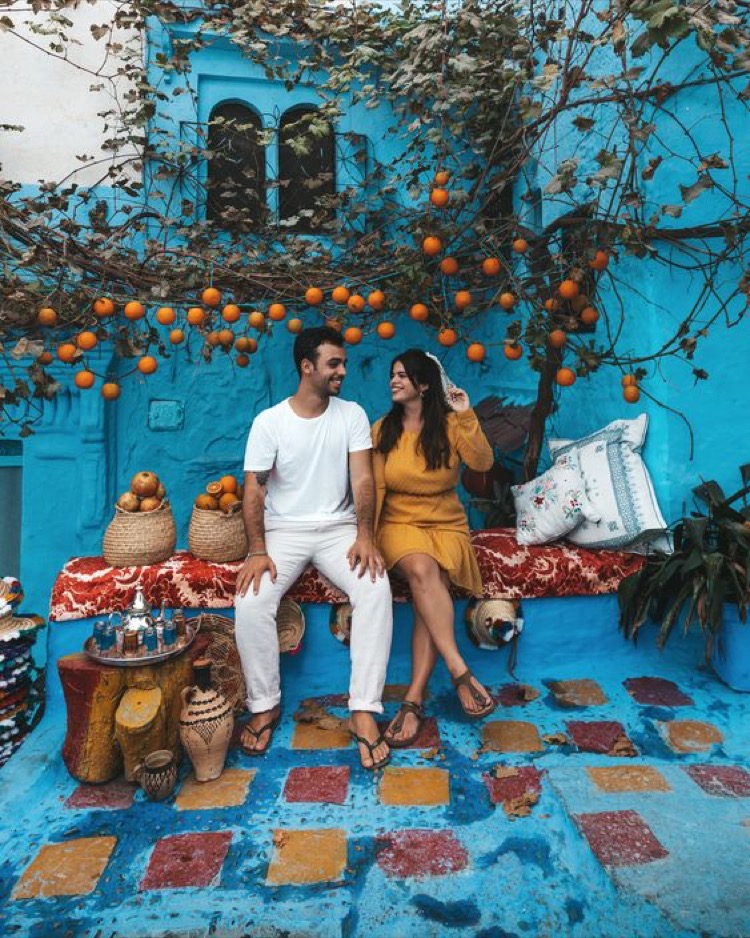
In general, it is sufficient for men to follow the following recommendations.
- In general, men should prefer long trousers, shirts or T-shirts.
- Long shorts can be worn in hot weather, but long trousers are required in mosques.
- Note that in some rural areas shorts are considered underwear 🙂
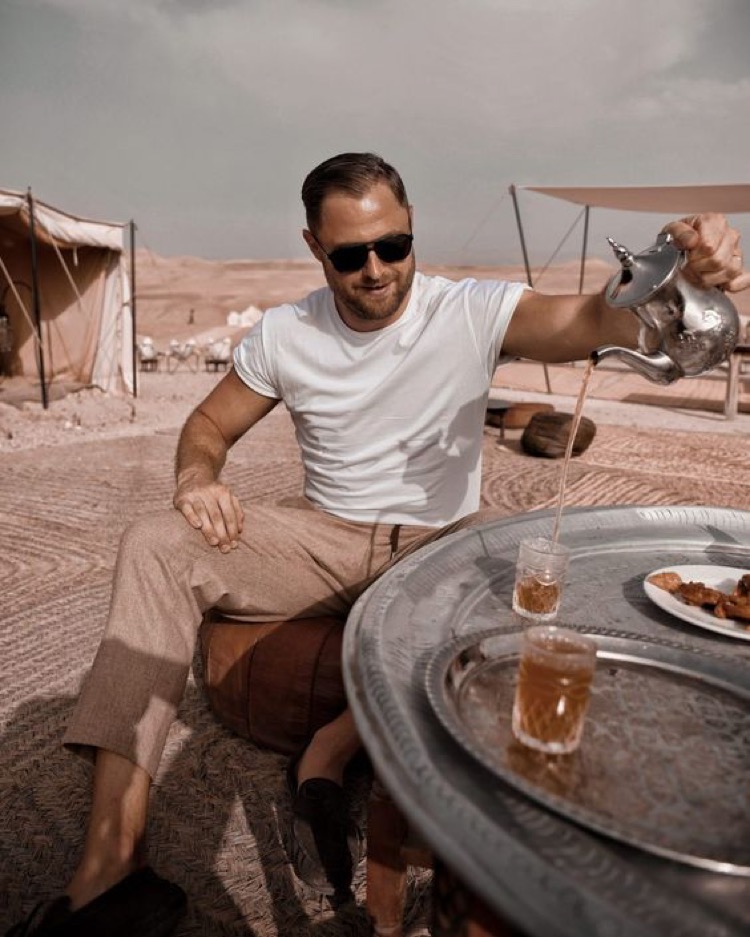
Indispensables of Moroccan Outfits for Men and Women
- Sun hat: After all, we are in Africa. The sun hits us differently here, hats are important
- Winter beanie: If you are planning to visit the Atlas Mountains or the Sahara Desert, a warm beanie is a good idea for the cold weather in the morning and at night.
- Scarf: A lightweight scarf, useful for both men and women, is essential in the Sahara to keep the sun and sand off your face. It can also be used when visiting mosques and religious sites.
- Swimwear: Bring a swimsuit to cool off in hotel and riad pools.
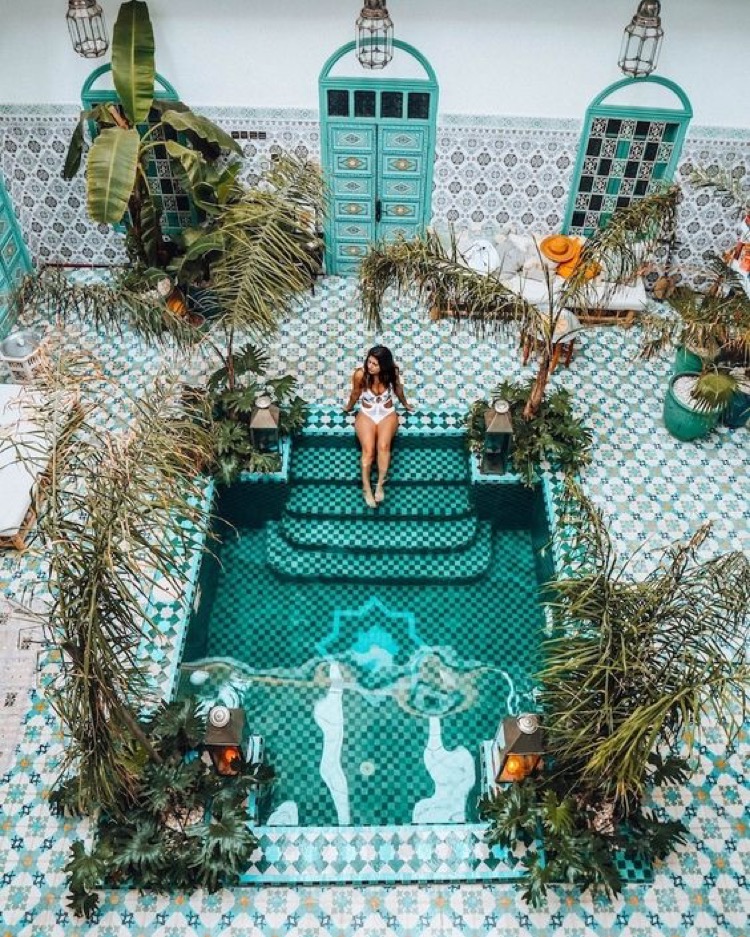
Best Shoes for Morocco:
- Sandals Sandals are preferable in hot weather. However, make sure they are comfortable for a long walk.
- A shoe suitable for walking: When exploring cities and especially old towns, the streets can be a bit bumpy. You should bring a shoe suitable for walking
- Sports shoes: Trainers can be suitable for many activities in Morocco. They will provide comfort, especially in areas such as the Atlas Mountains or the Sahara.
- Flip flops: Flip flops can come in handy, especially if you plan to visit a hammam or spend time at the pool/beach.
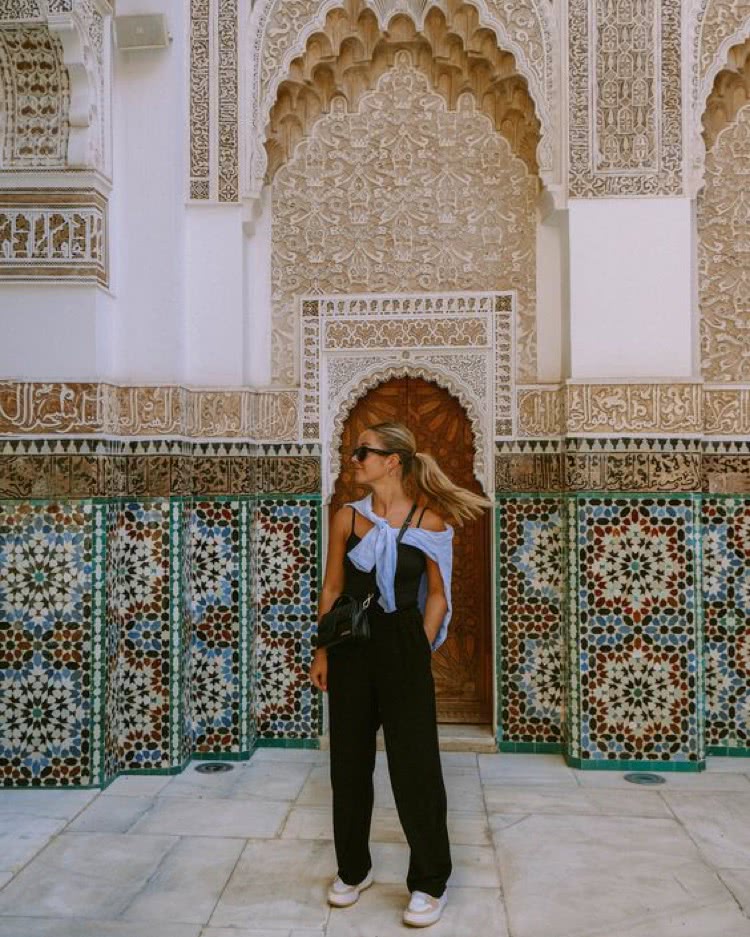
Seasonal Requirements for Morocco:
Summer – June – August:
- Sun protection: A large hat and sunglasses
- Cool clothes Choose loose, breathable clothing
- Light jacket For cool evenings at high altitudes or in desert areas, bring a light jacket.
- Long clothes: Choose long shorts that cover the knees and shoulders for women and long shorts for men.
Winter – November – February:
- Warm clothes: Take a warm jacket and underwear.
- Windbreaker: In coastal areas, wear a windbreaker against windy weather.
- Closed shoes and socks: Closed-toed shoes and socks will be needed.
- Beanie and scarf: Keep a woollen beanie and scarf for the head and neck on cold days.
Spring – mid-March – May | Autumn – September – October:
- Jacket or windbreaker for the evening: Keep a jacket or windbreaker for the evening as it can get chilly at night.
- Cool clothes: Take loose, breathable clothing that will keep you cool during the day.
- Both open and closed shoes: You can choose between sandals and closed shoes. As long as they are suitable for walking.
- For desert travelling: Take a scarf to tie around your face to keep the blowing sand at bay.
- Mosquitoes: Remember to use mosquito repellent containing DEET to prevent mosquito bites.
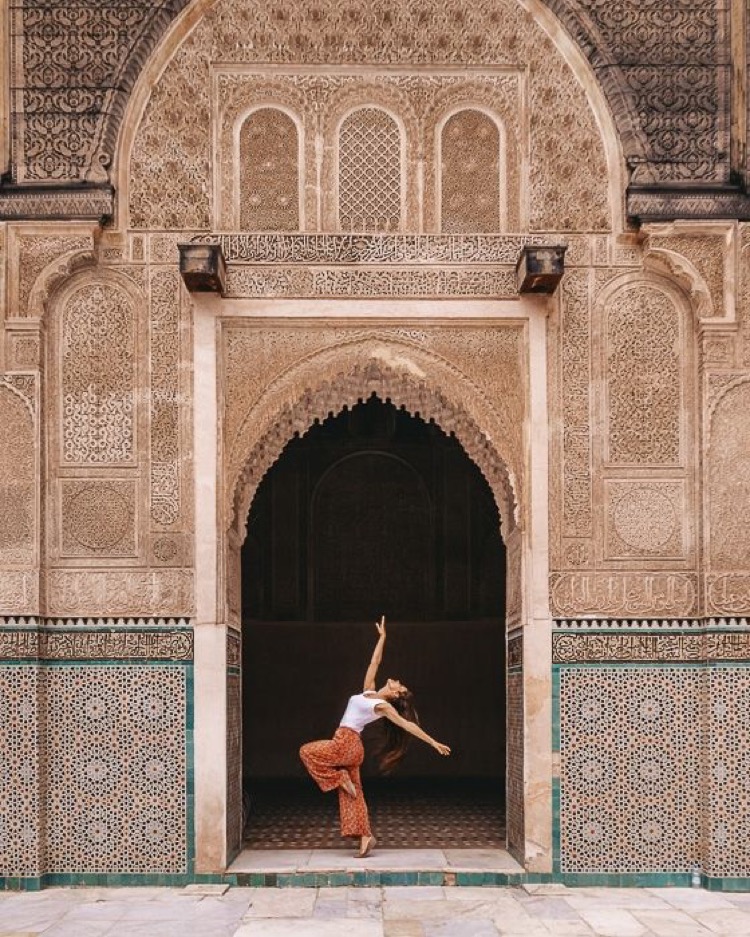
Choosing the Right Suitcase for Morocco Travel
When visiting Morocco, it is important to choose a practical and manoeuvrable luggage. Especially if you will be staying in Medinas such as Marrakech or Fez, you should consider easy portability. Since vehicle access to the Medinas is limited, you may need to carry your luggage to your accommodation.
Places like Fez in particular can be challenging with large suitcases due to the stairs and narrow streets. Also, the roads of the Medinas can be littered with donkey faeces, so it is important to choose a sturdy bag.
Opt for a bag with sturdy wheels and preferably one that can be towed on two wheels. Or a large rucksack may be more practical.
Backpack and Day Bag for Travelling in Morocco
A day bag is also very important for travelling to Morocco. In addition to daily use, you may need to leave your suitcase and take only the necessary items, especially in cases such as camel trekking at night in the Sahara Desert.
You can choose a lightweight and foldable backpack. Especially for busy cities and tourist areas, a backpack with anti-theft features should be preferred.
Petty crime is quite common in Morocco’s big cities and tourist areas, so it is important to be careful. It will be useful to buy a crossbody bag with zip pockets.
A lightweight fanny pack is ideal for travelling, especially in crowded souks or night outings.
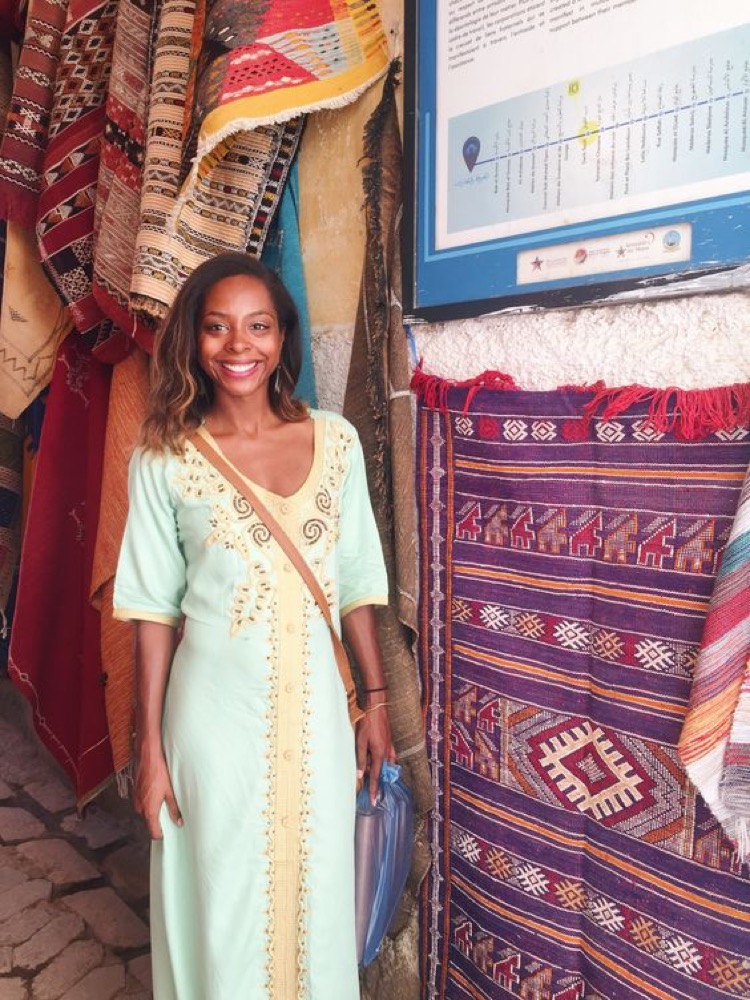
Power Adapters and Portable Chargers for Travelling in Morocco:
In Morocco 220V voltage and 50Hz, type C and E sockets with two circular terminals are used. Therefore, it is compatible with the adapters we use in Europe and Turkey.
However, I recommend bringing a powerbank with you when travelling. It will be especially useful for charging your devices in the absence of electricity, for example in the Sahara Desert.
Travel Water Bottle for Travelling in Morocco:
Drinking tap water is not recommended in Morocco. Therefore, it is very important to have a water bottle with you while travelling. Instead of buying plastic bottles of water every day, it will be more economical and environmentally friendly to keep a large water bottle in your hotel room and car and fill it every day.
Medicines and personal items for travelling to Morocco:
When travelling to foreign countries, it is important to be prepared to meet your health and personal needs. I suggest you think about the medicines and personal items you should have with you throughout your trip.
When it comes to essential medicines, the medicines you should include in your travel bag include painkillers such as paracetamol or aspirin, tablets against motion sickness and anti-diarrhoea pills. I also recommend having a first aid kit with you in case of emergencies.
Preparing a medicine kit to meet your personal health needs while travelling will help you to be prepared for unexpected health problems.
Personal items for travelling to Morocco:
When travelling to Morocco, do not forget to bring products such as sunscreen and mosquito repellent. These products can be quite expensive in Morocco.
Practical solutions such as insect repellent wristbands can also be useful while travelling. Such products are ideal if you do not want to use sprays and want to avoid fluid restrictions when travelling by plane.
It is also important to take some of the items you need with you before travelling, bearing in mind that you may not be able to find them easily in Morocco. In particular, I recommend bringing essentials such as hygiene products. You may not always have access to these products, so be sure to take them with you before travelling.
Other personal items may include a bath towel, a small mirror, toiletries, shaving equipment and a sewing kit including safety pins.
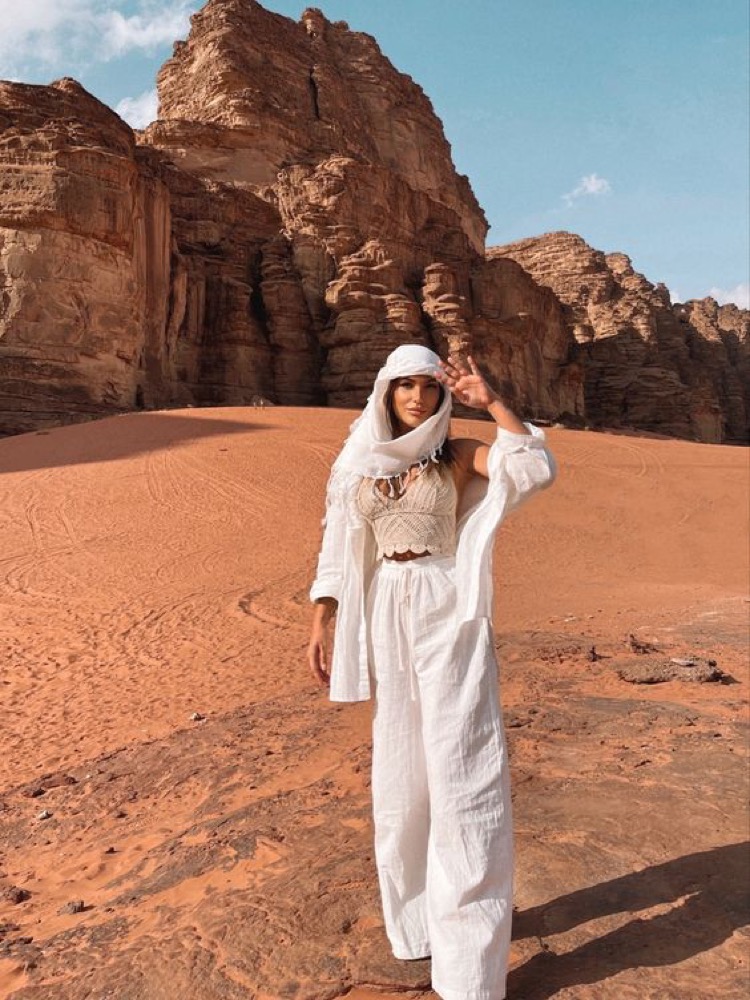
Travel Size Wipes and Hand Sanitiser for Morocco Travel:
While travelling in Morocco, you should be prepared for situations where you may encounter toilet and hygiene issues. Especially considering the difficulties you may encounter during train journeys and general toilet use, you should keep a small pack of travel wipes in your bag. This will also come in handy when you cannot find toilet paper.
Also, hand sanitiser is another important item you should have with you. Hand sanitiser will be especially useful when you eat on the street or clean your hands in unhygienic environments.
Ear Plugs for Travelling in Morocco:
When travelling in Morocco, you will have long car journeys. If you want to sleep during these journeys, ear plugs can be useful for you. You can also use earplugs to have a comfortable sleep at night and not wake up with the morning call to prayer.
Travel Umbrella for Travelling to Morocco:
If you plan to visit Morocco during the rainy season, you should take a sturdy travel umbrella or raincoat. Especially during the rainy period between October and April, you may encounter sudden rains. Besides that, the umbrella can also be used to block the sun’s rays, so a travel umbrella can benefit you at any time of the year.
Moroccan Dirham for Travelling to Morocco:
The use of cash is quite common in Morocco and credit cards may not be accepted in many places. For this reason, it is necessary to get some Moroccan dirham at the airport or exchange offices as soon as you arrive in Morocco.
The dirham is the official currency of Morocco and is only valid within Morocco. It cannot be exchanged or used in other countries. For this reason, be careful not to carry too much cash during your trip and take as much as you need. At the end of your trip, you can convert the remaining dirhams back into foreign currency at the exchange bureaus at the airport with the currency exchange certificate you received upon arrival.
Be sure to take these with you when travelling to Morocco!
- Your passport Make sure you keep your passport in a safe place and that it is valid for the duration of your trip.
- Credit/Debit Cards: Make sure you have opened your credit or debit cards for international use in Morocco. It may also be wise to carry a spare credit or debit card with you.
- Documents: Don’t forget to take your documents such as airline tickets or e-tickets, travel insurance, etc.
Frequently Asked Questions
What should I pack for a trip to Morocco?
When packing for Morocco, it is important not to forget essentials such as light clothing, comfortable shoes, scarves, toiletries, electronics and important documents. Do not forget to choose the appropriate clothing and other items according to the climate and your planned activities.
Is there a specific Moroccan packing list I should follow?
Yes, a packing list for Morocco should be created taking into account the unique climate and culture of the region. This list usually includes modest clothing, sun protection products and versatile footwear that will allow you to comfortably navigate the varied terrain.
What items are required to travel to Morocco?
To travel to Morocco, you are absolutely required to carry certain items such as a valid passport, travel insurance, any necessary visas or permits and a copy of important documents. It is also important to pack appropriate clothing, toiletries and any medication you may need for possible health issues.
Should I take a swimsuit for my trip to Morocco?
Yes, if you plan to visit coastal areas, resorts or enjoy swimming pools, it is advisable to take a swimsuit with you.
Do I need to bring an adapter for my electronic devices when travelling to Morocco?
Yes, you may need to bring a suitable adapter for your electronic devices as Type C and Type E electrical outlets are often used when travelling to Morocco. This will allow you to charge your devices without any problems throughout the trip.
How should female tourists dress in Morocco?
Female tourists in Morocco should dress modestly, especially in public and religious spaces. Loose clothing covering shoulders, arms and legs should be preferred. Maxi skirts or dresses, long-sleeved shirts and light trousers are suitable options. A scarf or shawl may be worn if necessary to cover the head or shoulders.
Is it appropriate to wear jeans in Morocco?
Yes, in Morocco it is generally accepted to wear jeans for both men and women, especially in urban areas and tourist places.
Should I take a backpack or a suitcase to Morocco?
Whether to take a backpack or a suitcase to Morocco depends on your personal preference and the nature of your trip. Backpacks are often more convenient for exploring cities and navigating crowded areas. On the other hand, suitcases can help you keep your belongings more organized and protected. To decide which option suits you best, consider your travel itinerary and the activities you have planned.
What should I avoid wearing in Morocco?
Although there are no strict dress codes enforced by law in Morocco, it is considered respectful to avoid wearing overly revealing clothing, especially in conservative areas. Clothes that expose too much skin or are very tight should be avoided.
Do women have to cover themselves in Morocco?
While there is no strict requirement for women to cover themselves in Morocco, dressing modestly, especially in public and religious settings, is considered a respectful practice. Many Moroccan women prefer to cover their shoulders and legs due to cultural and religious norms. However, tourists are not expected to follow the same level of modesty as locals. That said, dressing conservatively while exploring Morocco can be an important way to show respect for the local culture.
Can women wear shorts in Morocco?
Wearing shorts is not prohibited for women in Morocco, but it is recommended to consider cultural norms and opt for modest clothing. In more liberal and touristy areas like Marrakech or beach resorts, knee-length shorts might be acceptable. However, in conservative regions, choosing longer skirts or pants is more appropriate to avoid unwanted attention or causing offense. Regardless of the location, respecting the cultural values of the local people is important when traveling.
What type of clothing should I bring if I want to dress like Moroccans?
If you want to dress like Moroccans, consider bringing clothing that reflects the cultural preferences of the country. Colorful and intricately patterned pieces, such as kaftans, djellabas, or traditional tunics, are popular and showcase Moroccan fashion. These types of garments can enhance your travel experience by connecting you with Morocco’s culture and aesthetics.
Do I need to cover my head when visiting religious sites in Morocco?
Yes, it is generally required to cover your head when entering mosques or other religious sites in Morocco. This is an important way to show respect for Islamic customs. It is advisable to carry a lightweight scarf or shawl that you can easily use to cover your head when needed.
Should my knees and shoulders be covered while traveling in Morocco?
Yes, it is recommended to ensure your knees and shoulders are covered, especially in more conservative or religiously significant areas of Morocco. Dressing appropriately in these regions can lead to more positive interactions with locals and make your travel experience more enjoyable.
Is it acceptable to haggle when shopping in Moroccan markets?
Yes, haggling is not only acceptable but also expected when shopping in Moroccan markets. Vendors often quote inflated prices, so negotiating is a common practice. However, it is important to be respectful during the process, and if you can’t agree on a price, it’s perfectly fine to politely walk away.
What should I buy in Marrakech?
Marrakech is a captivating city known for its unique souvenirs. I recommend purchasing leather goods such as bags, wallets, shoes, jackets, and belts. Traditional Moroccan ceramics, pottery, and glassware are also popular options. Textiles, ranging from rugs and kilims to pillowcases and bedspreads, make great gifts as well. Additionally, you can bring home delicious traditional foods like dried fruits, nuts, or sweet pastries to savor the flavors of Marrakech.
Are there mosquitoes in Morocco?
Yes, mosquitoes are common in Morocco and can bite year-round. Travelers are advised to use mosquito repellent to prevent bites and reduce the risk of mosquito-borne diseases. Look for repellents containing DEET, a scientifically proven ingredient. Wearing light-colored clothing and avoiding standing water, especially during dawn and dusk, can also help minimize exposure to mosquitoes.
Can I drink tap water in Morocco?
Drinking tap water in Morocco is generally not recommended, as there is a small risk of illness. The chlorination process effectively removes most harmful bacteria and viruses, but it’s still safer to take precautions. Travelers heading to remote areas are advised to use bottled water due to the potential presence of bacteria. Many Moroccans boil tap water as an extra precaution. If you choose to drink tap water, make sure it has been boiled first.
Can I consume alcohol in Morocco?
Alcohol consumption is allowed in licensed establishments such as hotels and restaurants in Morocco. However, drinking alcohol in public spaces and carrying it across borders is prohibited. As Morocco is a Muslim country, these restrictions are in place to align with local customs and regulations.
I hope this helps you decide what to pack for your trip to Morocco! 🙂
If you have any additional questions or need help with anything else, feel free to ask. Have a great trip!
